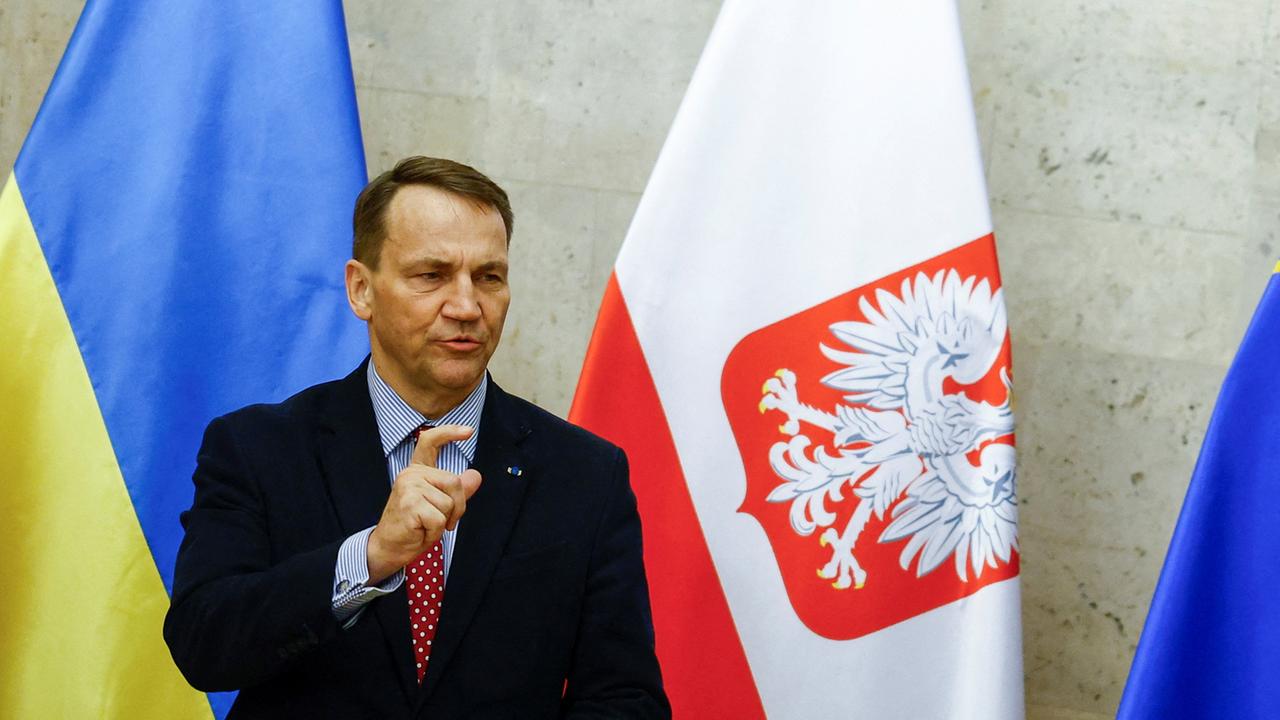The new Polish Foreign Minister Sikorski’s first trip abroad took him to Kiev. He called for more arms efforts by the West. Controversial topics such as the Polish truck blockades were also addressed.
Poland and Ukraine have committed to their close cooperation: After the change of government in Warsaw, Foreign Minister Radoslaw Sikorski’s first trip abroad was to Kiev. He assured the beleaguered neighboring state of support in the war against Russia.
“In this huge battle, Mr. Minister, Poland is on your side,” Sikorski said to his Ukrainian colleague Dmytro Kuleba. During the meeting, air alarms sounded as a warning of possible Russian attacks. “I believe that this is the last colonial war in Europe and it must end like this: Russia should lose and Ukraine should win,” Sikorski made clear.
Sikorski calls for more efforts from the West
He also called for further efforts from Western countries. “If the West mobilizes, I have no doubt who will win, but it has to finally start mobilizing,” Sikorski said. Western economies are “20 times richer than Russia” – but Moscow has “switched its economy to war mode.”
Ukraine supporters cannot allow Russia to produce more despite its smaller economy. “Because wars are not won through tactical battles, wars are won through production.”
Conversation about truck blockades at the border
Poland and Ukraine are close allies, even though there were increased tensions between Warsaw and Kiev under the previous right-wing nationalist government. Recently there was a dispute over Ukrainian grain exports and the activities of Ukrainian transport companies in Poland, which led to a blockade of the border crossings between the two countries by Polish truck drivers. Polish freight forwarders complain of “unfair competition” from Ukrainian companies after the EU suspended a number of requirements for border transport due to Russia’s war of aggression.
Kuleba expressed his hope for an end to the “unacceptable” blockade of Polish transport companies on the common border. Polish Deputy Infrastructure Minister Pawel Gancarz said Poland hoped for a solution before Christmas or the end of the year.
Zelenskyj interprets Armaments cooperation at
The two governments also apparently talked about more intensive bilateral cooperation. “We discussed very serious possibilities for further joint work,” said Ukrainian President Volodymyr Zelensky in his evening video address. “This applies especially to joint arms production.” He didn’t give any details.
The war in Ukraine is a war of artillery – that’s why both sides are striving for a secure supply of ammunition.
Russia is attacking in several areas
According to many Western military experts, Russia has once again taken the initiative at the front. Attacks are mainly reported in the Kupiansk, Bakhmut and Avdiivka areas. Russian military bloggers report smaller advances and gains in territory, which are geolocated and confirmed by experts at the Institute for the Study of War (ISW).
A few days ago, the Ukrainian army had to admit that the military situation in the northeast of the country was “complicated”. The Russian troops are “superior” in terms of weapons and personnel in the region around the city of Kupiansk, said Oleksandr Syrsky, the commander of the Ukrainian army, on the Telegram online service.
Hatched: territories occupied by Russia
Drones attack Odessa
At the same time, Russia continues to try to weaken Ukraine’s economy. In the evening, the port city of Odessa was attacked by Russian drones. Several waves of missiles filled with explosives flew over the Black Sea and residents of the city and the surrounding area were asked to seek shelter.
As a large port city, Odessa is crucial for Ukrainian exports – for example grain and cooking oil. Despite Russian attacks and threats against civilian shipping, the port continues to operate.
Romania is expanding the Danube
Around 60 percent of Ukrainian wheat exports currently go through Romania. From the smaller Ukrainian Danube ports of Reni and Izmail, the ships head for the Romanian Black Sea port of Constanta, first sailing on the Danube and then either over the Sulina arm or through the Cernavoda canal towards the sea.
The Sulina arm is the central main arm of the Danube in its delta at the mouth of the Black Sea. Of the three main branches, Sulina is the straightest because it has been repeatedly dredged for more than 100 years. To improve transit, Romania recently expanded the Sulina arm. It is now also navigable at night, the Lower Danube River Administration announced. Illuminated buoys have been provided in the water and on the banks. 18 additional pilots and a modern, digital navigation system were also made available.




